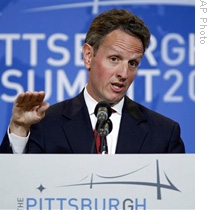Pittsburgh
25 September 2009
The leaders of the world's wealthiest nations and key emerging economies are in Pittsburgh, assessing efforts to fight the recession, and seeking ways to prevent future financial problems. A key U.S. official says the G20 leaders are close to a consensus on the crucial task of reforming financial regulations.
 |
| Timothy Geithner briefs reports before the start of the the G20 summit, in Pittsburgh, 24 Sep 2009 |
"We are not going to walk away from the greatest economic crisis since the great depression and leave unchanged, leave in place the tragic vulnerabilities that caused this crisis," he said.
Geithner told journalists that the progress on financial reform includes the contentious issue of the huge bonuses paid to bankers.
German and French officials argue these bonuses prompted bankers to take reckless risks in pursuit of short-term profits. Those profits turned to massive losses in some cases, threatening to bring down the financial system.
Leslie Gelb of the Council on Foreign Relations says public anger at the bankers strengthens the hand of those arguing for tougher regulation.
"The recent experience with financial greed and irresponsibility will push the center of gravity in this debate more toward regulation," said Gelb. "The fact is that regulators should have caught what these banks were doing."
But U.S. officials say a better way to prevent economic problems is to require banks to keep larger reserves to cover losses from bad loans or failed investments.
The secretary-general of the Organization for Economic Cooperation and Development, Angel Gurria, agrees.
"Strengthening the banks capital," said Gurria. "The story of the banks is capital, capital, capital, that is the big solution."
Besides strengthening banks and regulation, many G20 nations have been trying to strengthen their economies by spending huge sums building roads, bridges and other public works projects. They also slashed interest rates to historic lows.
At the Pittsburgh meeting, leaders are trying to figure out when they should cut back these stimulus efforts.
The head of the International Monetary Fund Dominique Strauss-Kahn, says not quite yet. "It is not the time for advanced economies to organize an exit strategy. We have to think about it, but not implement it now," he said.
Economists say if the stimulus programs end too soon the economy could relapse into recession. But if these expensive public works programs go on too long, they push nations deeper into debt, while low interest rates eventually raise the risk of inflation.
Large trade imbalances are another issue under discussion here.
China for example sells more than it buys on international markets, while the United States is in the opposite position, running up a huge trade deficit.
Some economists say this is one of the economic imbalances that contributed to the recession.
Secretary Geithner says the recession is forcing American consumers to cut their spending.
"For too long, Americans were buying too much, and saving too little ?that is no longer an option for us or for the rest of the world," he said.
Geithner says major exporters will have to look elsewhere for markets for their products, perhaps boosting demand in their own nations.